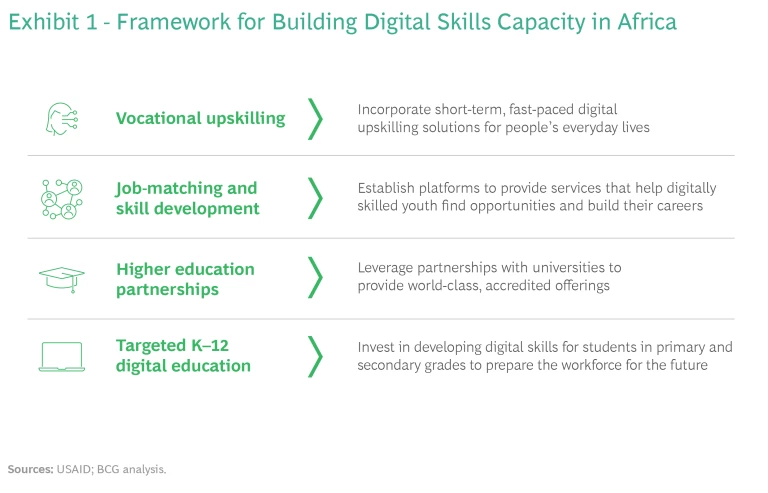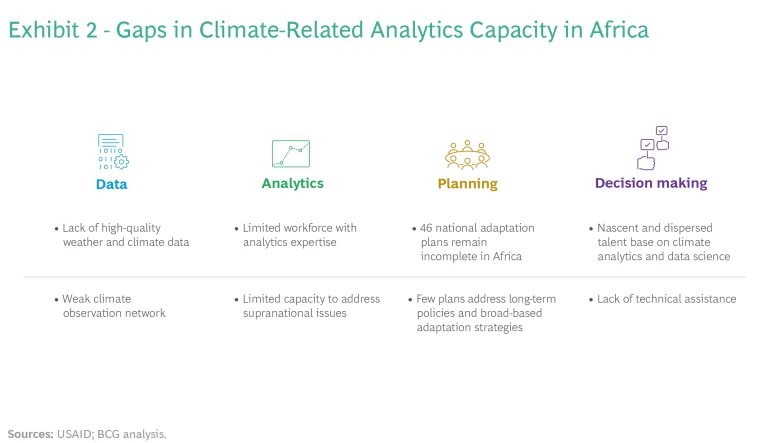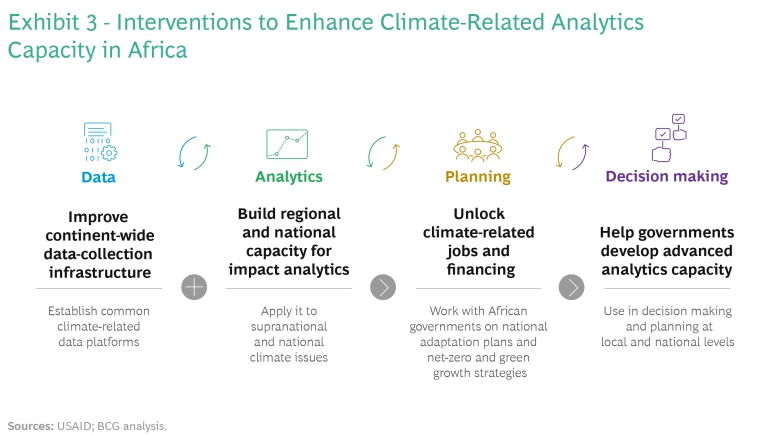The continent is rich in youthful, entrepreneurial energy. Well-planned investments now can help Africa transform itself into a global center of technological and ecological innovation.
Africa is at the cusp of massive growth and acceleration in the world. By 2050, about 40% of the world’s population under 18 will have been born and raised in Africa. This demographic trend is one of several that will change the trajectory on the continent. Other key trends include the rise of megacities, disproportionate impacts of climate change, and accelerating global engagement on the part of governments and other institutions. With continued and robust investment and development in Africa, its 1.3 billion people are likely to become the world’s most rapidly expanding workforce and consumer market.
Mainstreaming digital skills and unlocking the power of climate analytics are potential game changers in accelerating economic progress in Africa.
Many opportunities exist to amplify and accelerate economic progress in Africa—from education and health care to agriculture and technology. Two, in particular, stand out as potential game changers. The first is a concerted effort to mainstream digital skills among all Africans, particularly young Africans entering the global workforce. The second is unlocking the power of data analytics to build a more climate-resilient Africa.
If these opportunities get the resourcing, attention, and focus they deserve, then Africa will become home to multiple global centers of innovation. A recent USAID report prepared with support from BCG found that Africa has a compelling need and the right capabilities to realize its innovation potential. Doing so, will take a collective effort by national governments, the private sector, civil society, and Africa’s development partners.
The Challenge of Rising Digital Skills
Africa’s digital and technology sectors are poised for growth. Sub-Saharan Africa’s internet penetration has increased tenfold since 2010, three times the rate of global expansion. According to projections, Africa’s digital economy will reach $180 billion by 2025, and $712 billion by 2050. The continent has developed a vibrant innovation ecosystem in fields like mobile financial services, telemedicine, and e-commerce. Many Africans want to become entrepreneurs in these fields. In 2019, Africa had more than 600 technology hubs—organizations offering facilities and support for digital startups—with at least a third of them emerging since 2018.
COVID-19 accelerated the move to digital activity, especially when governments and businesses championed mobile-based services as an alternative to face-to-face contact. Many of these changes are continuing. For example, the telemedicine market in the Middle East and Africa is estimated at more than $3.8 billion in 2022 and is expected to reach $6.4 billion by 2027.
Despite all this momentum in the digital and technology sectors, Africa still has a long way to go. The continent still has the lowest worldwide internet usage rate. Only about 40% of the population has internet access, compared to the global average of 66%. Given the internet’s potential to drive positive impact and the youthful demographics of Africa’s population, increasing access to the internet is critical.
About 87 percent of African business leaders identify digital skills development as a priority area in need of further investment. Currently, African countries score between 1.8 and 5 on the Digital Skills Gap Index, far below the global average of 6. Of the world’s 20 countries with the weakest digital skills, 12 are in Africa, and only 11% of Africa’s tertiary education graduates have formal digital training. In short, to meet the demand for digital services on the continent, 650 million workers would need to be trained or retrained in digital skills by 2030.
For technology and education enterprises to meet this massive demand, investments in four types of interventions are viable. They all complement each other, and address both short- and long-term needs. (See Exhibit 1.) Putting them into place will require several different types of organizations and groups in partnership: the local private sector, on-the-ground incubators (funding and fostering entrepreneurial startups), global technology companies, and institutions of higher education: local colleges in Africa and universities in the US and Europe.
Global partners can support and play a role in each of these intervention channels. Global technology companies are already beginning to invest in Africa; the USTDA’s Access Africa program has included companies such as Citi, Cisco, and IBM. Some top-tier universities are developing programs in Africa (such as Carnegie Mellon University Africa in Rwanda) or collaborating with local educational institutions. African universities, for their part, are expanding to keep up with the growing college-age population, and the number of globally ranked African universities is rising.
Climate Analytics and Planning
The second opportunity for transforming the continent is borne of necessity. Africa is disproportionately vulnerable to the effects of climate change. Although the continent has contributed to less than 4% of global greenhouse gas emissions, 16 of the 20 most climate-vulnerable nations in the world are in Africa. Moreover, 33 out of the 54 African countries rank in the bottom quartile of world nations in readiness to deal with climate change. Only 8 out of the 54 African countries have taken the preliminary step of submitting comprehensive national adaptation plans (NAPs) of the UN Framework Convention on Climate Change (UNFCCC), which are often used to channel investment in infrastructure, land use, and food security.
Decision makers have long articulated a need for support to understand the risks, financing needs, and trade-offs related to climate change, especially for the most-vulnerable populations. Today, data-informed planning is constrained by the insufficient quality and granularity of climate data for the African continent. Analytic capabilities—which are needed to apply the data and insights to real-world decision making and action—are also limited. (See Exhibit 2.) Investment in these competences is critically important for the continent. It will enable evidence-based decision making by building up the necessary infrastructure and skills.
It’s clear that further development in this area is feasible, as evidenced by several successful Africa-based projects using data and information to mitigate crises related to climate. One project is the Famine Early Warning Systems Network (FEWS NET), which was started in 1985 by USAID. It tracks and analyzes food security for 30 African countries. FEWS NET helped alert and mobilize governments and NGOs to reduce famine levels during the droughts of 2011 and 2016–2017. Another is the Weather and Climate Information Services for Africa (WISER), implemented by the UK-Met Office and the African Climate Policy Centre of the UN Economic Commission for Africa, to improve weather forecasting and information services on the continent.
Exhibit 3 shows four interrelated areas with great promise for enhancing climate-related analytics capacity, and thereby improving decision making and planning. The first is to invest in data collection infrastructure, gathering detailed information on weather and climate patterns, emissions, and vulnerability.
The second is to build capacity for impact analytics at national and regional levels, taking advantage of the capabilities of government departments and local universities. Currently, the workforce is limited; apprenticeships and in-depth training programs could address this issue and the need for digital upskilling at the same time. Given the need for scale, supranational analytic hubs could be established, with multiple nations contributing resources and talent to each.
The third is planning. There should be established support for governments to develop NAPs under UNFCCC guidelines. They may also need plans to deliver universal energy access with low-carbon production technologies, along with green economic strategies that can unlock financing and help create jobs. One goal should be to establish Africa as a growth region for green technology.
Finally, the use of data, analytics, and planning to enable and drive informed, long-term, and proactive decision-making on the part of public, private, and civil society leaders. Letting the science and data drive decisions and planning will ultimately safeguard African nations and peoples from the harsh impacts of climate change.
It will take a continent-wide effort to accomplish everything described above. Most critical will be the collection, sharing, and management of climate data on common data platforms, the pooling of data and climate science talent and expertise, and transparency of information among national and local governments. Home-grown talent together with global technical assistance to national governments to help them continually refine and implement NAPs and other plans along with scaling of cooperative efforts across the continent will underwrite success.
With measures like these in place, governments, the private sector, development finance institutions, and civil society will be able to move rapidly to mitigate the effects of climate change and develop a future-ready African talent base.
If you would like to learn more about emerging trends and policy developments in digital skills and climate analytics in Africa, read the full report, Transformational Development in Africa. The report was commissioned by the USAID Mission to the African Union and prepared with support from Boston Consulting Group.









